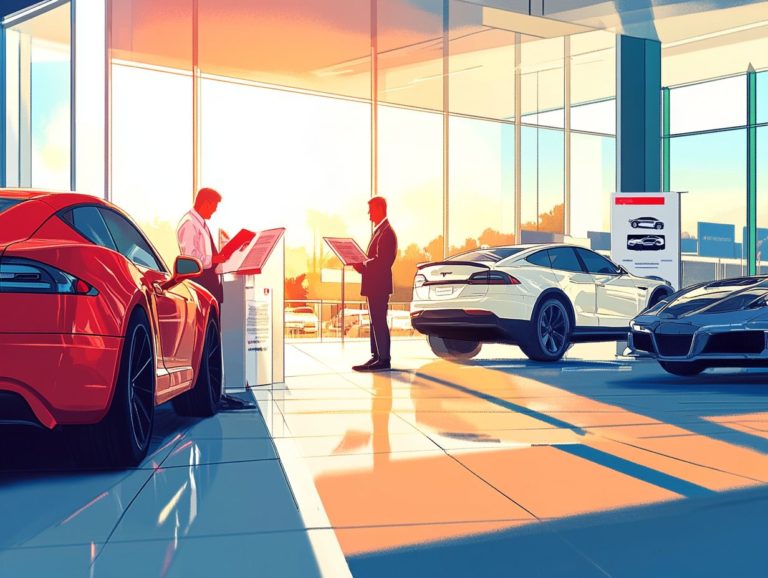Understanding MSRP and Invoice Prices
Navigating the car-buying landscape can feel overwhelming, especially when faced with terms like MSRP and invoice price. Grasping these pricing concepts is essential for making informed decisions that could lead to significant savings.
This article delves into what MSRP is and its purpose, explores the invoice price and its role in vehicle pricing, and highlights the various factors that influence both.
You ll learn how to leverage this knowledge during negotiations, empowering you to secure the best deal possible. Dive in now and transform into a savvy car buyer today!
Contents
- Key Takeaways:
- What is MSRP?
- What is Invoice Price?
- Factors that Affect MSRP and Invoice Prices
- How to Use MSRP and Invoice Prices in Car Buying
- Frequently Asked Questions
- What is MSRP and how is it different from Invoice Price?
- Why is MSRP higher than Invoice Price?
- Do I have to pay the MSRP when buying a product?
- Is it better to negotiate based on MSRP or Invoice Price?
- Are there any other factors that can affect MSRP and Invoice Prices?
- Is it possible to get a product for lower than the Invoice Price?
Key Takeaways:
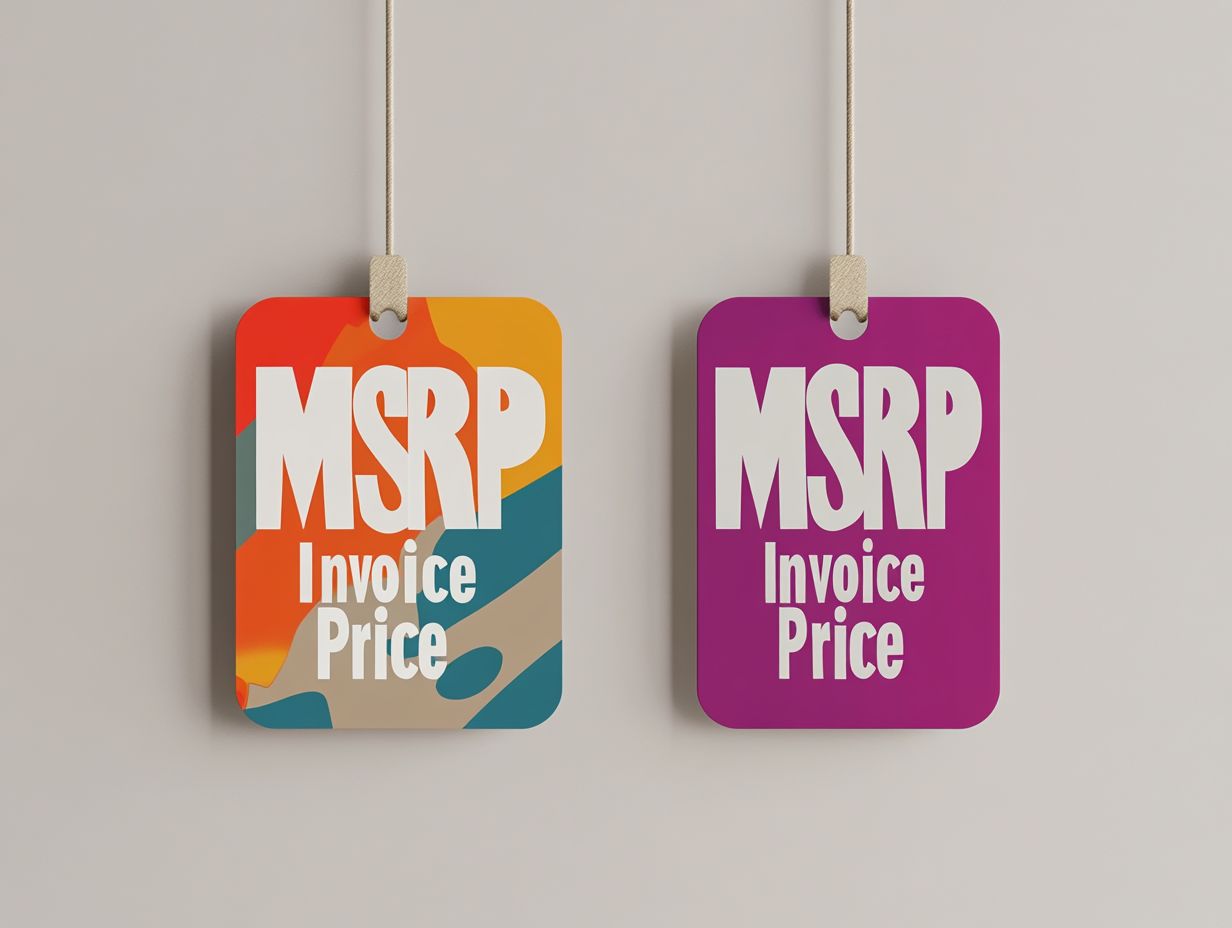
- MSRP stands for Manufacturer’s Suggested Retail Price and is the price recommended by the manufacturer for a product. It serves as a starting point for negotiations in car buying.
- Invoice price is the amount a dealer pays for a vehicle from the manufacturer. It is not the final price for a consumer, but understanding it can give buyers more leverage in negotiations.
- The factors that affect MSRP and invoice prices include manufacturer’s costs, market demand, and competition. Buyers should research these factors and use them to their advantage in negotiations.
What is MSRP?
The Manufacturer’s Suggested Retail Price, or MSRP, is the recommended selling price of a new car set by the manufacturer. This figure establishes a baseline for car pricing within the automotive industry.
For you, this suggested price is an important guide, helping you assess a reasonable price for a car and grasp the overall pricing landscape as you contemplate your vehicle purchase.
Definition and Purpose
The MSRP, or Manufacturer’s Suggested Retail Price, serves as a guiding light for you as a car buyer, indicating the price you can expect to pay in the automotive market.
This figure serves as both a benchmark and a reference, helping you assess the fair value of any vehicle. By establishing a foundation for your price expectations, it enables you to negotiate effectively, advocating for a fair deal instead of merely accepting the first offer that comes your way.
Knowing the MSRP helps you compare prices easily across different models, enhancing your capacity to evaluate various vehicles effectively. This price awareness becomes essential when utilizing automotive pricing tools like Kelley Blue Book and Edmunds, which provide further clarity on vehicle valuation and market trends.
What is Invoice Price?
The invoice price, commonly known as the dealer invoice, reflects the amount a car dealership pays to the manufacturer for a new vehicle. This figure is a crucial element of vehicle costs within the automotive industry.
By grasping the intricacies of the invoice price, you gain valuable insight into the dealer’s profit margins the difference between the dealer’s cost and the selling price which can be instrumental in effectively negotiating your car purchase.
Definition and Role in Vehicle Pricing
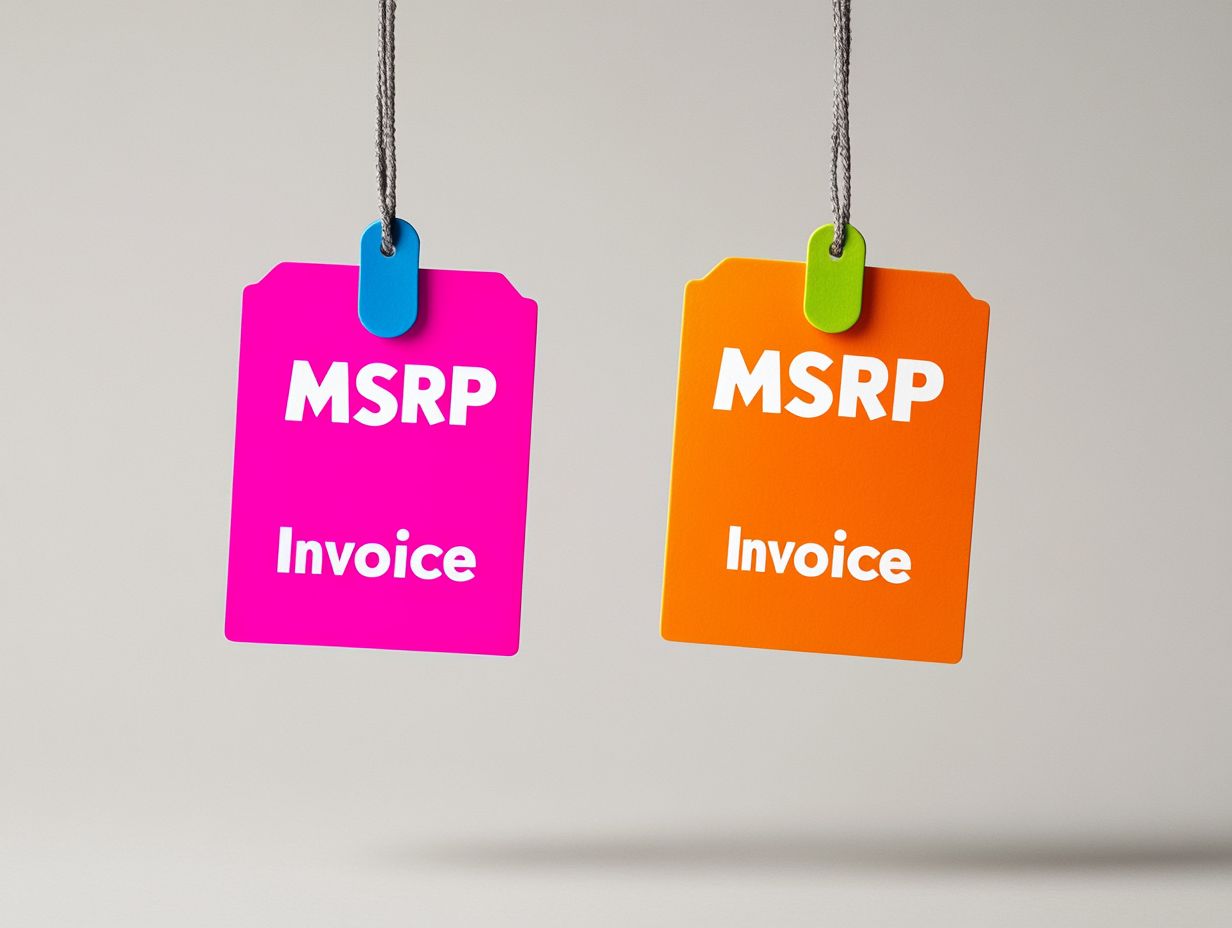
The invoice price represents the actual cost a car dealership incurs when purchasing a vehicle, playing a pivotal role in shaping the overall pricing structure in the automotive industry.
Grasping the concept of the invoice price is crucial for you as a consumer, as well as for dealers, since it significantly impacts dealer profit margins and pricing strategies. For dealers, the gap between the invoice price and the retail price determines their profit potential; a tighter margin might lead to more competitive pricing but could also squeeze their profits.
On the other hand, you can utilize invoice pricing information to negotiate better deals, ensuring that you re paying a fair price. Being well-informed enables you to engage in the purchasing process with confidence, potentially reducing your overall expenditure while also holding dealers accountable for fair pricing practices.
Factors that Affect MSRP and Invoice Prices
Several factors influence both MSRP and invoice prices, such as manufacturer costs, dealer incentives, market demand, and the competitive landscape of the automotive industry.
Each of these elements shapes the final pricing of vehicles, helping you understand what drives these numbers.
Manufacturer Costs
Manufacturers face many costs. These include production expenses like materials and labor. If raw material prices go up, expect the MSRP to rise too. This directly affects what you pay at the dealership.
These costs also include ongoing expenses like utilities and facility maintenance. Understanding how these costs are calculated helps you make informed decisions about your purchase.
Recognizing these financial dynamics is essential, as they impact your overall ownership experience and budget as a prospective vehicle owner.
Market Demand and Competition
Market demand and competition play a crucial role in shaping MSRP and invoice prices, influencing how dealers price their inventory.
If you show interest in a popular model perhaps due to good reviews dealers may raise their prices. For example, a compact SUV known for fuel efficiency might see a price hike if competitors offer less appealing options.
Conversely, if a new sedan enters a crowded market, dealers may offer competitive pricing to attract buyers. This often leads to promotional discounts on less popular models, keeping inventory appealing even as demand changes.
How to Use MSRP and Invoice Prices in Car Buying
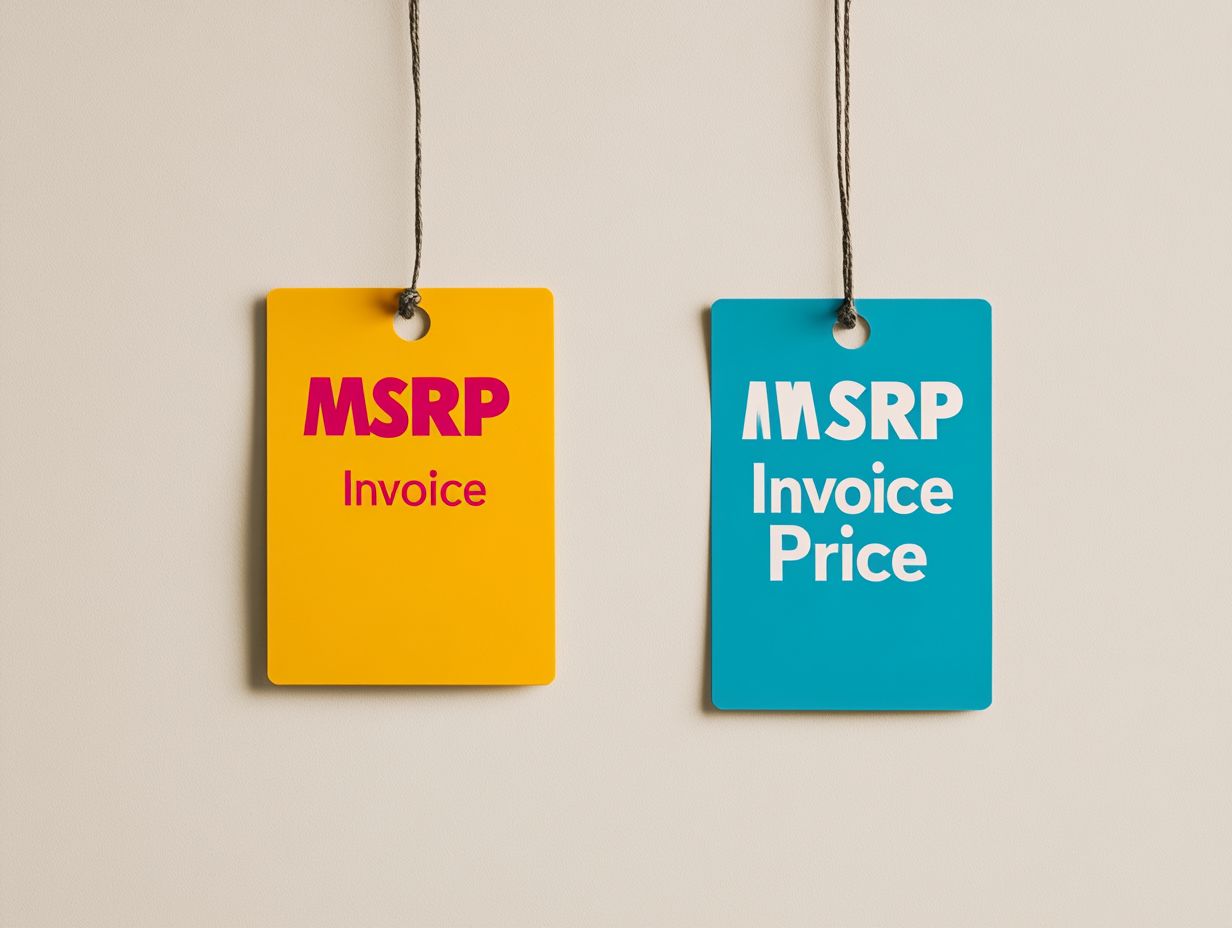
Understanding MSRP and invoice prices gives you the tools to navigate the car buying process confidently. This knowledge, along with understanding MSRP vs. sale price when buying, helps you negotiate better and make smart choices about your vehicle purchase.
Understanding Negotiation Power
Know your negotiation power! Familiarize yourself with MSRP and invoice prices to challenge dealer pricing confidently.
Gathering quotes from different dealerships gives you an advantage. Use online resources to compare prices and maintain a firm stance during discussions.
This approach strengthens your position and encourages dealers to be more accommodating, maximizing your potential savings and reducing unnecessary expenses.
Other Considerations in Pricing
When you re diving into car pricing, it s essential to factor in optional add-ons, dealer charges, and other expenses that can significantly affect the final price during your vehicle purchase.
Understanding these costs helps you avoid financial surprises later. Features like extended warranties and roadside assistance may sound appealing but may not fit your specific needs.
Dealer fees can vary significantly and increase the overall cost. It s wise to conduct thorough research to account for all potential expenses.
Don t forget about maintenance, insurance, and fuel. Creating a comprehensive budget outlining your expected monthly costs is a smart way to prepare for car ownership.
Frequently Asked Questions
What is MSRP and how is it different from Invoice Price?
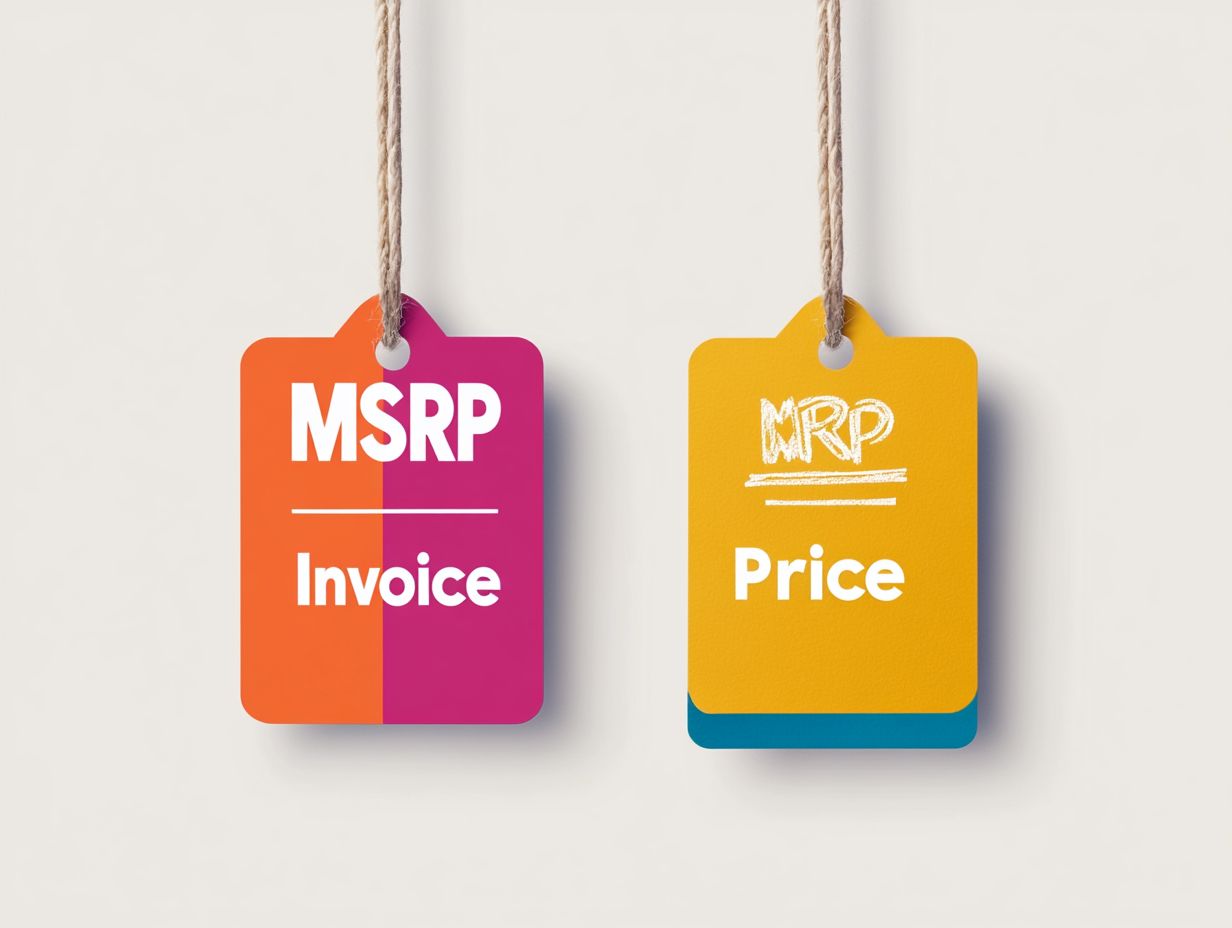
MSRP stands for Manufacturer’s Suggested Retail Price. This is the price that the manufacturer recommends for selling the product.
Invoice Price is what the dealer paid to the manufacturer. This price is usually lower than MSRP.
Why is MSRP higher than Invoice Price?
MSRP is typically higher because it includes the manufacturer s profit margin and various fees, such as advertising costs. Invoice Price reflects the cost paid by the dealer, who sells it at a higher price for profit.
Do I have to pay the MSRP when buying a product?
No, you don t have to pay the MSRP. It s just a suggested price, and you may pay less due to negotiations or discounts.
Is it better to negotiate based on MSRP or Invoice Price?
Negotiating based on Invoice Price is often better since it s the actual cost for the dealer. However, you can use MSRP as a starting point.
Are there any other factors that can affect MSRP and Invoice Prices?
Yes, factors like market demand, competition, and special promotions can affect prices.
Is it possible to get a product for lower than the Invoice Price?
Yes, you may get a product for less than Invoice Price, especially with negotiations or promotions. However, dealers still need to make a profit.




